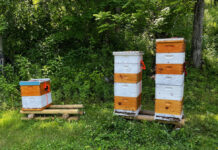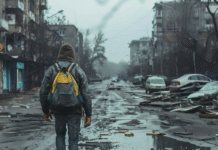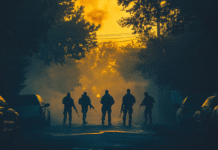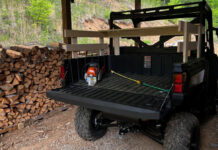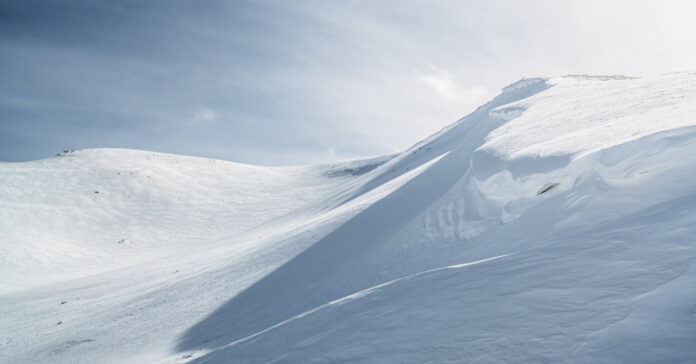
Yesterday, I read this article that details the predicament of some Californians trapped in their homes by anywhere from five to ten feet of snow. People are running out of food, baby formula, and diapers. They are being told to “stretch their food stores” because rescuers can’t reach them. In most cases, that means trying to get a few days or a week’s worth of food to last two weeks. It’s so bad, they are dropping MREs to some of them from helicopters.
I feel bad for these folks, but I also can’t help but think they should have prepared a little better. Imagine how they would fare if the disaster wasn’t snow that will eventually melt but volcanic ash that will persist or nuclear fallout that means they can’t leave home for six weeks without risking radiation sickness. Events like this show how poorly prepared most individuals are for any kind of disaster.
Old timers around here tell of a storm back in the 1960s (or maybe even the ‘50s) that hit this area with five feet of snow, trapping some people for 30 days. So we know it happened at least once. Are people around here prepared for it to happen again? My guess is that the older folk, especially the natives, are. Lots of them still put up vegetables, can their own food, and cook from scratch. I expect they would be OK. The younger folks and the people that moved here recently? They would be 15 pounds skinner and chewing on their shoe leather after being trapped 30 days.
I just can’t imagine not having enough food to last a month. Don’t people have pantries any more?
Normalcy Bias
Expecting things to be fine because they have always been fine before is an example of normalcy bias. These Californians thought, “We’ve had snow storms before and it’s always been fine. Therefore, it will be fine this time.” But Mother Nature had a surprise in store for them. Honestly, they should not have been that surprised. It’s been a wet winter after years of drought. Something was bound to give. Plus, forecasts were calling for at least two feet of snow.
These complacent folks are not so different from the old timer who dies in his beachside home because he refused to leave. After all, he tells people, he rode out five hurricanes, and it’s never been as bad as they predicted. He never stopped to think that those were Category 1 or 2 and weren’t direct hits. So the Category 4 that comes ashore half a mile away washes his home off its foundation and he dies in the flooding. The hurricane killed him, but so did his normalcy bias.
Preppers cannot afford to be affected by normalcy bias. Sometimes that’s tough, because normalcy bias is subtle, and it whispers, “don’t worry, everything will be fine.” Doing nothing is the easy course of action. You have to resist the pull of history and recognize that sometimes you get a 100-year flood that wipes away a house that’s been sitting there for 30 years. So when they report snow, or flooding, instead of thinking “We’ve been fine before,” you need to think, “What’s the worst that could happen?” and prepare for that.
I would argue that the act of prepping is the exact opposite of caving in to normalcy bias. That’s why preppers prepare for the worst and hope for the best.
There’s Always a First Time
Just because something hasn’t happened yet doesn’t mean it won’t. Every day, we play the odds. The odds are we won’t get hit by a bus, struck by a wayward bullet, have a heart attack or an aneurism, get in a car accident, or win the lottery. Yet every day, things like that happen to someone. Sometimes they happen to people we know, and we feel terrible, but we rarely stop and think, “That could have been me.”
It’s easy to stop taking precautions. For example, a beekeeper I know got stung 18 times last year in a single incident. It was unprecedented. I think I’ll keep wearing my jacket and veil, even when it’s hot and the bees are “friendly.” Because sometimes the bees will turn on you for no apparent reason. Likewise, one day, that friendly horse will kick you. Someday, someone will be distracted and run a red light. One day, you’ll be at the wrong place at the wrong time. Smart folk learn to be wary.
I’ve carried a gun for 30 years and haven’t had to shoot anyone. Does that mean it’s useless, and I should stop carrying it? Or does that mean the odds are increasing that one day I may have to shoot in self defense? (Funny thing, odds. If I flip a coin and it comes up heads six times in a row, are you going to bet on heads or tails? Well, it’s still just 50/50, but most of us would bet on heads.)
Sometimes, the First Time Isn’t
Sometimes, “the first time” something happens isn’t really the first time, just the first time in memory, or the first time in recorded history. But memory only goes back decades and recorded history goes back centuries, or maybe a couple thousand years in some parts of the world.
When someone tells you, “That’s the coldest it’s ever been in this city on March 5,” what they mean is “that’s the coldest March 5 in which humans with thermometers have been around to record it.” My guess is it could well have been colder many times before the first European settlers came by with their clocks, calendars, thermometers, barometers, record books and other equipment. Beyond that, I expect it was colder during the last ice age, but for some reason that doesn’t count.
In many parts of the country, recorded history goes back less than 200 years. For example, I doubt anyone was measuring the depth of the snow in the San Bernardino Mountains 150 years ago. Mostly because the few folks in the area were smart enough to live in the valleys and didn’t cross the mountains in the winter. They could look up, see the snow, and know not to go up there. Now people live there, and most of the time, they get away with it.
Consider the Breadth of History
If we put the past 40 years without a serious war in Europe in perspective, we would realize that it was a rare period of relative peace. For centuries, wars broke out across Europe almost constantly, and they rarely ended for longer than it took the next generation of kids to grow old enough to become soldiers. When viewed through the lens of history, we should see war as the standard state of affairs, not as a shocking exception.
When we look at disasters on the larger scale, there have always been storms at sea, enormous floods, unexpected earthquakes, mountains that erupted into volcanoes, and even the occasional hunk of rock that flew down from the heavens and plowed into earth, leaving a wake of destruction behind it. Just because we don’t remember these large-scale disasters doesn’t mean they won’t happen again.
Some of these events in the distant past were so big they became responsible for our myths, like Atlantis, or made it into the Bible, like the flood for which Noah built his ark. Ancient people explained some of these events as the actions of the Gods, but today all we have left are stories and legends. Then there are carved rocks warning of drought that were uncovered in European rivers; they had not been seen in centuries, but were proof the water levels had been that low at least once before.
Let that be a reminder: just because no one remembers a hurricane or a drought that bad doesn’t mean there wasn’t one. For all we know, there could have been dozens.
If you look at history, you will find it is full of disasters, violence, cruelty, starvation, war, and strife. Why should we expect anything less? As the King Arthur legend reminds us, the good times come to an end.
My advice is to prepare. Once again, the good times are coming to an end. And if they don’t? Then you will be ready for a blizzard or another localized disaster. Mankind has survived so far; let’s do what we can to contribute to its future survival.
UPDATE: I am adding this additional content and link a couple hours after posting the original article. I came across this article on Zero Hedge which gives more details, including a woman “preparing to save her last logs of wood for her fireplace” in case their gas goes out. I’ve never heard of the problem it describes with the gas meters, and I wonder if this is only an issue with meters designed for use in warm places. It was never a problem when I lived in the Great White North.
This is a good example of why you need a back-up heat system. This potential scenario is why we keep a pallet of firewood in our attached garage. It’s always dry and in the event of a blizzard or soaking rain, we have a large stash of emergency firewood accessible without leaving the house.
Dis you see where the woman said she’s lived there since the 1970s and its never happened before? “Truly one of a kind.” Or, more accurately, truly the first time they’ve had that much snow since the 1970s.

